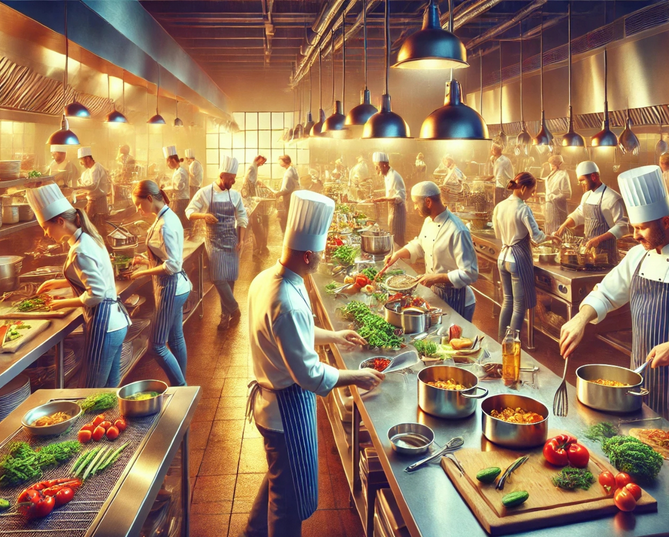The Importance of Teamwork in a Kitchen: Lessons from the Brigade System

In the high-pressure environment of a professional kitchen, teamwork isn’t just a benefit; it’s a necessity. The Brigade system, developed by French chef Auguste Escoffier, is a structured hierarchy that organizes kitchen staff into specific roles. Each person—from the executive chef to the commis—is responsible for a particular station and set of tasks. This system is designed to streamline workflow, reduce confusion, and enable the team to produce high-quality dishes efficiently, even during the busiest service hours. Here’s how teamwork within the brigade system contributes to the success of any kitchen and the lessons it imparts to Chef de Parties.
1. Clear Communication: The Key to Smooth Service
In the kitchen, timing and clarity are everything. Each station relies on clear and concise communication to maintain rhythm and ensure orders are executed in sync. Chef de Parties, who lead specific stations like the grill or pastry, are responsible for coordinating with their team and other stations to keep the workflow smooth. Quick updates, calls for assistance, and precise requests help prevent delays, especially during peak service.
Lesson: Good communication ensures everyone knows their role and responsibilities, reducing the chances of errors and allowing the team to adapt to challenges quickly. For Chef de Parties, honing these communication skills helps establish trust and ensure consistency.
2. Trust and Dependence on Each Role
The brigade system divides tasks across specialized roles, meaning each team member’s work impacts the entire operation. Chef de Parties, for instance, rely on commis chefs for prep work while also depending on other stations for components like sauces or garnishes. This interdependence builds a strong sense of trust and responsibility, as each member knows that the quality and timing of their work affect the whole team.
Lesson: Every team member’s contribution is vital. Trusting colleagues to do their part while focusing on one’s responsibilities fosters a supportive work environment that empowers everyone to perform their best.
3. Adaptability and Flexibility in a High-Pressure Environment
Kitchens are fast-paced, with changing orders and unexpected challenges. Chef de Parties must be adaptable, shifting priorities to meet last-minute demands or help other stations that may be overwhelmed. The brigade system encourages flexibility, enabling Chef de Parties to step in and assist others when necessary, ensuring seamless service despite any obstacles.
Lesson: Adaptability and willingness to assist others are crucial in a kitchen team. In the brigade system, stepping outside one’s role when needed strengthens teamwork and keeps service running smoothly.
4. Efficiency Through Organization and Structure
The Brigade system’s structured nature ensures efficiency. Each station operates like a cog in a well-oiled machine, with clear responsibilities and workflows. Chef de Parties manage their stations, ensuring ingredients are prepped and organized for smooth cooking and plating. This level of organization minimizes downtime, optimizes resource usage, and reduces waste.
Lesson: Structure and preparation are vital to maintaining efficiency. By meticulously organizing their stations, Chef de Parties ensures the kitchen runs like clockwork, even during the busiest times.
Conclusion
The Brigade system teaches invaluable lessons about teamwork, trust, adaptability, and efficiency in the kitchen. For Chef de Parties, these dynamics are essential for leading a station and collaborating with other team members to deliver exceptional dining experiences. By fostering a culture of communication and mutual respect, the brigade system demonstrates the power of teamwork. It exemplifies how organized cooperation leads to success even in high-pressure environments.
#KitchenTeamwork #BrigadeSystem #ChefLife #KitchenDynamics #TeamworkInTheKitchen #ChefDePartie #RestaurantManagement #KitchenEfficiency #CulinarySkills #TeamworkLessons

